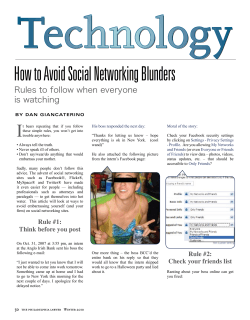
Twitter Smart Card
Twitter Smart Card Twitter 121511_1631 W2 Social Networks -Do’s and Don’ts Only establish and maintain connections with people you know and trust. Review your connections often. Assume that ANYONE can see any information about your activities, personal life, or professional life that you post and share. Ensure that your family takes similar precautions with their accounts; their privacy and sharing settings can expose your personal data. Avoid posting or tagging images of you or your family that clearly show your face. Select pictures taken at a distance, at an angle, or otherwise concealed. Never post Smartphone photos and don’t use your face as a profile photo, instead, use cartoons or avatars. Use secure browser settings when possible and monitor your browsing history to ensure that you recognize all access points. Managing your Twitter Account Twitter is a social networking and microblogging site whose users send and read text-based posts online. The site surged to worldwide popularity with +300 million active users as of 2011, generating 300 million tweets and 1.6 billion search queries daily. Stream of tweets from people you follow Use Settings to manage visibility Each tweet is timestamped Following are people you subscribe to Followers subscribe to your tweets Private tweets will only be visible to followers you approve Tweets “Tweets” are short text-based messages – up to 140 characters – that users post to Twitter. "Tweet" can refer to a post as well or to the act of posting to Twitter. Tweets are public, indexed, and searchable unless protected by the user. Many users never Tweet, choosing only to follow persons or topics of interest. Hashtags (#topic) are used to mark a keyword or topic in a Tweet. Posts with hashtag are categorized by topics in the Twitter search engine. Hashtagged words that become popular become Trending Topics (ex. #jan25, #egypt, #sxsw). Mentions (@username) are used to tag a user in a Twitter update. When a public user mentions a private Twitter account, the link to the private account profile becomes public. Profile Settings Apply the Profile settings shown below to ensure that your information is visible only to people of your choosing. This is how your profile page will look to visitors on the web DO NOT use a face photo Use nicknames, initials, or pseudonyms Use general location, such as a country or a metropolitan area DO NOT connect to Facebook Twitter Best Practices Avoid using hashtags (#) in updates to avoid being indexed and associated with a topic by Twitter Search. Tweet responsibly. Do not provide personal details regarding your whereabouts and activities in your post. Do NOT upload links to personal photos or websites on Twitter. Do NOT allow Twitter to use your location on mobile devices. Change your Twitter username periodically to limit account exposure. Twitter Smart Card Twitter 121511_1631 Account Settings Apply the Account settings shown below to ensure that your information is shared in a limited fashion. DO NOT connect your phone Change every ~6 months Check Protecting your tweets makes all your posts private Only those who you approve can access your tweets Uncheck Uncheck Click to delete all location data associated with your account Deactivating / Delete Your Twitter Account To deactive your account, go to Settings and select Account page. At the bottom of the page, click “Deactive my account.” After deactivation, the user can reactivate the account within 30 days. After 30 days, the account is permanently deleted. Notification & Application Settings Maintain a small digital footprint by minimizing the number of notifications. Revoke access to unnecessary third party applications. Direct message (DM) is never visible to the public Private tweets will become visible to the web when retweeted (RT) by a user with public account Block unknown or unwanted applications from accessing your account Useful Links A Parent’s Guide to Internet Safety Wired Kids Microsoft Safety & Security OnGuard Online www.fbi.gov/stats-services/publications/parent-guide www.wiredkids.org/ www.microsoft.com/security/online-privacy/social-networking.aspx www.onguardonline.gov/topics/social-networking-sites.aspx
© Copyright 2025







![08/19/10 - How to Dominate the Internet: Book One: Protect... [??????????] Tweet style="height:25px !important;" frameborder="0"](http://cdn1.abcdocz.com/store/data/000184910_1-2d7f7f5375a129fa1f0b9efd842f168c-250x500.png)













